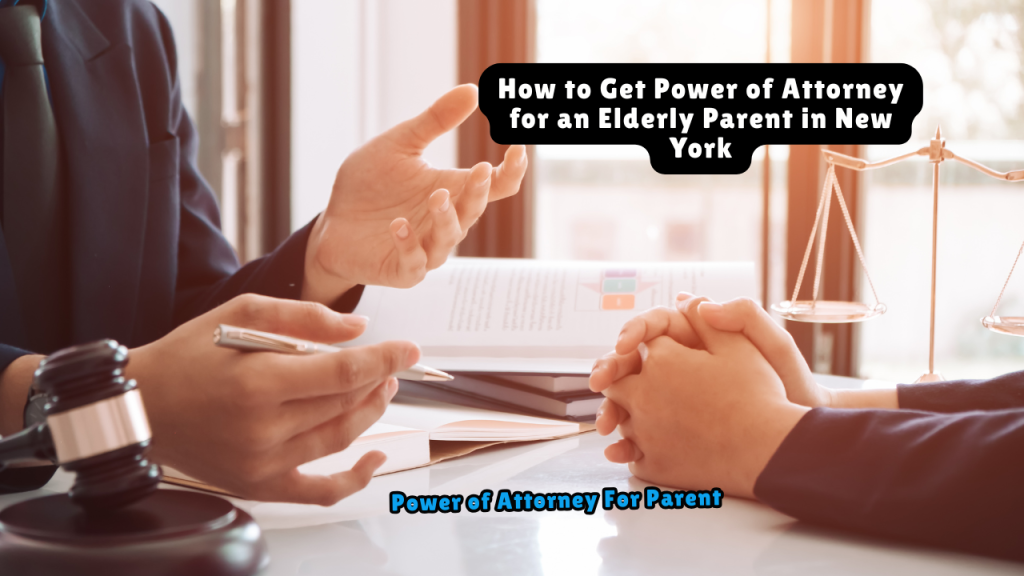How to Get Power of Attorney for an Elderly Parent in New York
As your parent ages, planning ahead becomes essential. A Power of Attorney (POA) is one of the most important legal tools to help you manage their finances, healthcare, and legal affairs. In New York, the process is straightforward—but it must be done correctly to be valid and enforceable.
This guide walks you through the steps, explains legal requirements, and highlights common mistakes to avoid.
Table of Contents
What Is Power of Attorney?
A Power of Attorney allows someone (your parent, the principal) to legally authorize another person (usually you, the agent) to make decisions on their behalf.
In New York, POA is governed by NY General Obligations Law § 5-1501, which was updated in 2021. The most commonly used form is the Durable Power of Attorney, but there are several types.
1. Determine the Type of POA Needed
New York recognizes several types of POA. Choosing the right one is critical:
Types of POA in New York:
- Durable POA – Remains valid if your parent becomes incapacitated.
- Non-Durable POA – Ends if your parent becomes incapacitated.
- Healthcare Proxy – Covers only medical decisions when your parent cannot make them.
- Limited (Special) POA – Grants authority for a specific task, like selling property.
Best Setup for Elderly Parents:
✔ Durable POA – For managing finances and legal matters
✔ Healthcare Proxy – For medical decisions
2. Ensure Your Parent Is Mentally Competent
Your parent must:
- Understand what the POA means.
- Be signing it voluntarily and without pressure.
If there’s a diagnosis like dementia or Alzheimer’s, act before legal capacity is lost.
Tip:
Get a doctor’s letter confirming your parent’s mental competence at the time of signing. This protects against future legal challenges.
If your parent is already incapacitated, you’ll need to pursue guardianship through Surrogate’s Court instead.
Related content:
Can a Nursing Home Override a Power of Attorney?

3. Use the Correct New York POA Form
New York has strict rules. You must use the Statutory Short Form POA, updated in 2021.
Where to get the forms:
Key Requirements:
✔ Signed by your parent (the principal)
✔ Notarized
✔ Signed by two witnesses
✔ If allowing gifting or asset transfers, include a Statutory Gifts Rider
4. Choose the Right Agent (and Backup Agent)
- Primary Agent: Often an adult child or spouse.
- Successor Agent: Takes over if the primary agent can’t serve.
Avoid Conflict:
- Don’t name multiple agents unless you require them to act jointly.
- Who CANNOT be a witness:
❌ The agent (you)
❌ The notary
❌ Anyone named in the POA
5. Sign and Notarize the POA
Your parent must sign the POA in front of a notary.
If the POA includes gifting powers, two independent witnesses must also be present.
Where to notarize:
- Banks (often free)
- UPS/FedEx stores (~$5–10)
- Mobile notaries (~$50–100)
The notary must confirm your parent understands the document and is signing willingly.
6. Distribute Copies to Key Parties
Once signed and notarized:
- Keep the original in a secure place (fireproof box or with an attorney).
- Give copies to:
- Financial institutions (if managing money)
- Doctors or hospitals (for healthcare proxy)
- Medicaid or VA if applying for benefits
- Financial institutions (if managing money)
Tip:
Some banks and agencies require certified copies, which you can get from the county clerk.
What If My Parent Can’t Sign?
If your parent is physically unable to sign:
- They may direct someone to sign on their behalf, in their presence.
- The notary must document this exception in the acknowledgment.
If your parent is mentally incapacitated, you’ll need to pursue guardianship through Surrogate’s Court. POA is no longer an option.
Can a POA Be Revoked?
Yes, if your parent is still competent, they can:
- Write and sign a revocation notice
- Notify all banks, doctors, and parties who have a copy
- Create a new POA, which automatically cancels the old one
Common Mistakes to Avoid
Using outdated POA forms (New York law changed in 2021)
Not notarizing or getting the proper witnesses
Naming someone untrustworthy as agent
Waiting too long—if your parent loses capacity, you’ll need court involvement
Final Advice
- Get both a Durable POA and a Healthcare Proxy
- Use current forms that meet NY state requirements
- Notarize and witness everything properly
- Keep communication open among family to avoid future disputes
- Review and update the POA every few years
Need Help?
- NY Elder Law Hotline: 1-800-342-9871
- New York State Bar Association: www.nysba.org
Bottom Line
Getting Power of Attorney for an elderly parent in New York is a proactive, essential step in long-term care planning. You’ll need the right forms, proper signatures, notarization, and witness confirmation. Act early—before your parent becomes incapacitated—to avoid guardianship and costly court processes.
About the Author

Sarah Klein, JD, is an experienced estate planning attorney who has helped clients with wills, trusts, powers of attorney, and probate matters. At All About Lawyer, she simplifies complex estate laws so families can protect their assets, plan ahead, and avoid legal headaches during life’s most sensitive moments.
Read more about Sarah
